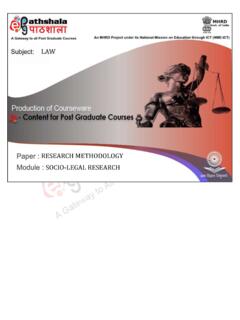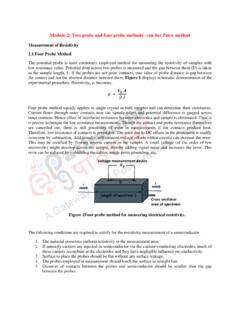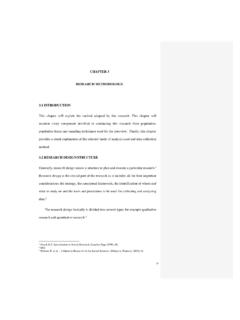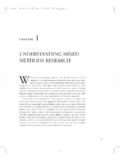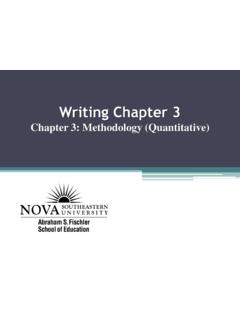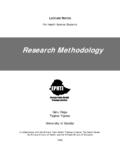Transcription of RESEARCH METHODOLOGY HYPOTHESIS - INFLIBNET Centre
1 LAW RESEARCH METHODOLOGY HYPOTHESIS DESCRIPTION OF MODULE Items Description of Module Subject Name Law Paper Name RESEARCH METHODOLOGY Module Name/Title HYPOTHESIS Module Id VII Learning Objectives In this module, you will learn: - The meaning and definition of HYPOTHESIS . - The Nature of HYPOTHESIS . - The Importance and use of HYPOTHESIS in RESEARCH METHODOLOGY .
2 - The Sources of HYPOTHESIS . - The Relationship between Variables and HYPOTHESIS . - The Types of HYPOTHESIS . - Formulating a good HYPOTHESIS . - Characteristics of a good HYPOTHESIS . - HYPOTHESIS Testing. - Errors in HYPOTHESIS Testing 1. Introduction: HYPOTHESIS is usually considered as an important mechanism in RESEARCH . HYPOTHESIS is a tentative assumption made in order to test its logical or empirical consequences. If we go by the origin of the word, it is derived from the Greek word- hypotithenai meaning to put under or to to suppose.
3 Etymologically HYPOTHESIS is made up of two words, hypo and thesis which means less than or less certain than a thesis. It is a presumptive statement of a proposition or a reasonable guess, based upon the available evidence, which the researcher seeks to prove through his study. A HYPOTHESIS will give a plausible explanation that will be Role Name Affiliation Principal Investigator Prof. (Dr.) Ranbir Singh Vice Chancellor, National Law University, Delhi Co-Principal Investigator Prof. (Dr.) Bajpai Registrar, National Law University Delhi Paper Coordinator Prof.
4 (Dr.) Bajpai Registrar, National Law University Delhi Content Writer/Author Prof.(Dr.) G S Bajpai, Dr. Ritu Sharma Registrar & Professor of law, National Law University Delhi Assistant Professor of law, National Law University Delhi Content Reviewer Prof. Department of Anthropology , University of Delhi tested. A HYPOTHESIS may seem contrary to the real situation. It may prove to be correct or incorrect. HYPOTHESIS need to be clear and precise and capable of being tested.
5 It is to be limited in scope and consistent with known or established facts and should be amenable to testing within the stipulated time. It needs to explain what it claims to explain and should have empirical reference. 2. Definition: A HYPOTHESIS can be defined as a tentative explanation of the RESEARCH problem, a possible outcome of the RESEARCH , or an educated guess about the RESEARCH outcome. 1 Goode and Hatt have defined it as a proposition which can be put to test to determine its validity . 2 Hypotheses are single tentative guesses, good hunches assumed for use in devising theory or planning experiments intended to be given a direct experimental test when possible 3.
6 According to Lundberg, A HYPOTHESIS is a tentative generalisation, the validity of which remains to be tested. In its most elementary stage, the HYPOTHESIS may be any hunch, guess, imaginative idea, which becomes the basis for action or investigation .4 Hence, a HYPOTHESIS is a hunch, assumption, suspicion, assertion or an idea about a phenomenon, relationship or situation, the reality or truth of which you do not know. A researcher calls these assumptions/ hunches hypotheses and they become the basis of an enquiry. In most studies the HYPOTHESIS will be based upon your own or someone else s observation.
7 HYPOTHESIS brings clarity, specificity and focus to a RESEARCH problem, but is not essential for a study. You can conduct a valid investigation without constructing formal HYPOTHESIS . The formulation of HYPOTHESIS provides a study with focus. It tells you what specific aspects of a RESEARCH problem to investigate. A HYPOTHESIS tells you what data to collect and what not to collect, thereby providing focus to the study. As it provides a focus, the construction of a HYPOTHESIS enhances objectivity in a study.
8 A HYPOTHESIS may enable you to add to the formulation of a theory. It enables you to specifically conclude what is true or what is false. Ludberg observes, quite often a RESEARCH HYPOTHESIS is a predictive statement, capable of being tested by scientific methods, that relates an independent variable to some dependent variable. 3. Nature of HYPOTHESIS : The HYPOTHESIS is a clear statement of what is intended to be investigated. It should be specified before RESEARCH is conducted and openly stated in reporting the results. This allows to: Identify the RESEARCH objectives.
9 Identify the key abstract concepts involved in the RESEARCH . Identify its relationship to both the problem statement and the literature review. 1 Sarantakos, S. 1998 (first published in 1993). Social RESEARCH . Macmillan: London. 2 Goode, & Hatt, in Social RESEARCH , McGraw-Hill. 3 Rogers, Eric. 1966. Physics for the enquiring mind. Prinston University Press: Prinston. 4 Social RESEARCH : a study in methods of gathering data. Longmans, Green and Co., 1929. Reprinted 1942 and 1953. 2nd ed., Greenwood Press, 1968.
10 A problem cannot be scientifically solved unless it is reduced to HYPOTHESIS form. It is a powerful tool of advancement of knowledge, consistent with existing knowledge and conducive to further enquiry. It can be tested verifiable or falsifiable. Hypotheses are not moral or ethical questions. It is neither too specific nor to general. It is a prediction of consequences. It is considered valuable even if proven false. 4. Importance of HYPOTHESIS : HYPOTHESIS though an important part of RESEARCH may not be required in all types of RESEARCH .

